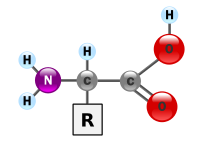
Photo from wikipedia
Under stressful conditions such as energy restriction (ER) and physical activity, the RDA for protein of 0.8 g · kg-1 · d-1 may no longer be an appropriate recommendation. Under catabolic… Click to show full abstract
Under stressful conditions such as energy restriction (ER) and physical activity, the RDA for protein of 0.8 g · kg-1 · d-1 may no longer be an appropriate recommendation. Under catabolic or anabolic conditions, higher protein intakes are proposed to attenuate the loss or increase the gain of whole-body lean mass, respectively. No known published meta-analysis compares protein intakes greater than the RDA with intakes at the RDA. Therefore, we conducted a systematic review and meta-analysis to assess the effects of protein intakes greater than the RDA, compared with at the RDA, on changes in whole-body lean mass. Three researchers independently screened 1520 articles published through August 2018 using the PubMed, Scopus, CINAHL, and Cochrane databases, with additional articles identified in published systematic review articles. Randomized, controlled, parallel studies ≥6 wk long with apparently healthy adults (≥19 y) were eligible for inclusion. Data from 18 studies resulting in 22 comparisons of lean mass changes were included in the final overall analysis. Among all comparisons, protein intakes greater than the RDA benefitted changes in lean mass relative to consuming the RDA [weighted mean difference (95% CI): 0.32 (0.01, 0.64) kg, n = 22 comparisons]. In the subgroup analyses, protein intakes greater than the RDA attenuated lean mass loss after ER [0.36 (0.06, 0.67) kg, n = 14], increased lean mass after resistance training (RT) [0.77 (0.23, 1.31) kg, n = 3], but did not differentially affect changes in lean mass [0.08 (-0.59, 0.75) kg, n = 7] under nonstressed conditions (no ER + no RT). Protein intakes greater than the RDA beneficially influenced changes in lean mass when adults were purposefully stressed by the catabolic stressor of dietary ER with and without the anabolic stressor of RT. The RDA for protein is adequate to support lean mass in adults during nonstressed states. This review was registered at www.crd.york.ac.uk/prospero as CRD 42018106532.
Journal Title: Advances in nutrition
Year Published: 2019
Link to full text (if available)
Share on Social Media: Sign Up to like & get
recommendations!